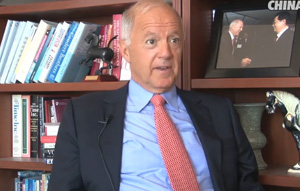Nature Group eyes China as science trendsetter
Updated: 2013-06-08 14:16
(Xinhua)
|
|||||||||||
SHANGHAI -- Chinese scientists are becoming more successful in getting their work published in Nature, according to Steven Inchcoombe, managing director of the journal's publishing group.
"Science development has been rapid in the past five years. Chinese scientists are now publishing 300 papers a year that are suitable for publication in Nature branded journals, while the figure was less than 50 five years ago," Inchcoombe told Xinhua.
The number of papers written by Chinese scientists accounts for 8.5 percent of Nature's overall papers, which indicates that they are successfully competing against their foreign counterparts to get work published, according to Inchcoombe.
This is one of the reasons why Nature Publishing Group's parent company is coming to China. Macmillan Publishers Limited announced Wednesday that it will open a Shanghai office in order to provide a commitment to scientists and science in the country.
"We are aiming to partner institutions and academic societies in China, to help develop journals...to be on the global stage," said Inchcoombe.
Karl Ziemelis, chief physical sciences editor, echoed Inchcoombe's comments and said Chinese scientists are capable of playing a key role in driving scientific research.
"In the coming years, we see new scientific research directions and areas emerging because of the research done in China rather than those done somewhere else," Ziemelis said.
Ziemelis said Chinese papers meet Nature's criteria, which "means that the quality, the impact of Chinese science is increasing."
Nick Campbell, executive editor of Nature and head of NPG Greater China, explained that the only criteria that the journal used when selecting work was the work itself.
The soon-to-be-opened office, Campbell said, will help Chinese scientists make final papers more acceptable.
"Anyhow, the biggest trick of getting into Nature, is to do fantastic research," Campbell added.
Related Stories
Scientist wants food waste criminalized 2013-01-25 00:08
HK encourages scientists to join sci-tech co-op 2012-09-28 17:13
Scientists decry rice experiment on children 2012-09-06 07:35
Chinese scientists turn kitchen waste into fuel 2012-04-30 15:06
Today's Top News
Police: Gunman killed 4 in California shootings
Chinese, US presidents start talks
Suspect in fatal bus fire identified
Liu Zhijun to stand trial on Sunday
Stakes high ahead of Xi-Obama summit
5.9-magnitude quake jolts Taiwan: CENC
3 missing after Shanghai cargo ships capsize
Gaokao opened to migrant students
Hot Topics
Lunar probe , China growth forecasts, Emission rules get tougher, China seen through 'colored lens', International board,
Editor's Picks

|

|

|

|

|

|





